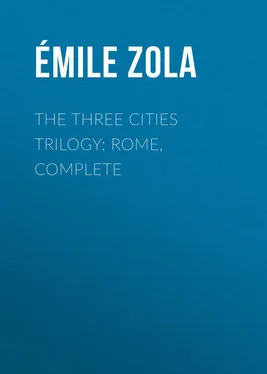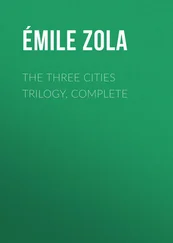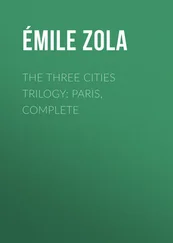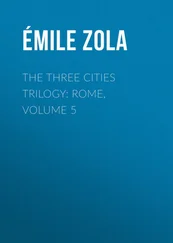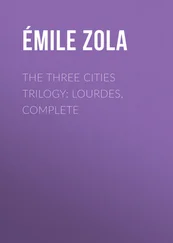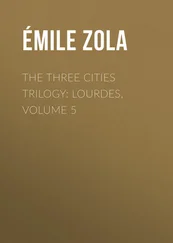Émile Zola - The Three Cities Trilogy - Rome, Complete
Здесь есть возможность читать онлайн «Émile Zola - The Three Cities Trilogy - Rome, Complete» — ознакомительный отрывок электронной книги совершенно бесплатно, а после прочтения отрывка купить полную версию. В некоторых случаях можно слушать аудио, скачать через торрент в формате fb2 и присутствует краткое содержание. Жанр: literature_19, foreign_antique, foreign_prose, на английском языке. Описание произведения, (предисловие) а так же отзывы посетителей доступны на портале библиотеки ЛибКат.
- Название:The Three Cities Trilogy: Rome, Complete
- Автор:
- Жанр:
- Год:неизвестен
- ISBN:нет данных
- Рейтинг книги:5 / 5. Голосов: 1
-
Избранное:Добавить в избранное
- Отзывы:
-
Ваша оценка:
- 100
- 1
- 2
- 3
- 4
- 5
The Three Cities Trilogy: Rome, Complete: краткое содержание, описание и аннотация
Предлагаем к чтению аннотацию, описание, краткое содержание или предисловие (зависит от того, что написал сам автор книги «The Three Cities Trilogy: Rome, Complete»). Если вы не нашли необходимую информацию о книге — напишите в комментариях, мы постараемся отыскать её.
The Three Cities Trilogy: Rome, Complete — читать онлайн ознакомительный отрывок
Ниже представлен текст книги, разбитый по страницам. Система сохранения места последней прочитанной страницы, позволяет с удобством читать онлайн бесплатно книгу «The Three Cities Trilogy: Rome, Complete», без необходимости каждый раз заново искать на чём Вы остановились. Поставьте закладку, и сможете в любой момент перейти на страницу, на которой закончили чтение.
Интервал:
Закладка:
At this Orlando indulged in a frank outburst of gaiety: “That’s a fine scruple! Was it your husband who instructed you to tell me of it? I know, however, that he affects some delicacy in this matter. For my own part, I believe myself to be as honest as he is, and I can only repeat that, if I had a son like yours, so straightforward and good, and candidly loving, I should let him marry whomsoever he pleased in his own way. The Buongiovannis – good heavens! the Buongiovannis – why, despite all their rank and lineage and the money they still possess, it will be a great honour for them to have a handsome young man with a noble heart as their son-in-law!”
Again did Stefana assume an expression of placid satisfaction. She had certainly only come there for approval. “Very well, uncle,” she replied, “I’ll repeat that to my husband, and he will pay great attention to it; for if you are severe towards him he holds you in perfect veneration. And as for that ministry – well, perhaps nothing will be done, Sacco will decide according to circumstances.”
She rose and took her leave, kissing the old soldier very affectionately as on her arrival. And she complimented him on his good looks, declaring that she found him as handsome as ever, and making him smile by speaking of a lady who was still madly in love with him. Then, after acknowledging the young priest’s silent salutation by a slight bow, she went off, once more wearing her modest and sensible air.
For a moment Orlando, with his eyes turned towards the door, remained silent, again sad, reflecting no doubt on all the difficult, equivocal present, so different from the glorious past. But all at once he turned to Pierre, who was still waiting. “And so, my friend,” said he, “you are staying at the Palazzo Boccanera? Ah! what a grievous misfortune there has been on that side too!”
However, when the priest had told him of his conversation with Benedetta, and of her message that she still loved him and would never forget his goodness to her, no matter whatever happened, he appeared moved and his voice trembled: “Yes, she has a good heart, she has no spite. But what would you have? She did not love Luigi, and he was possibly violent. There is no mystery about the matter now, and I can speak to you freely, since to my great grief everybody knows what has happened.”
Then Orlando abandoned himself to his recollections, and related how keen had been his delight on the eve of the marriage at the thought that so lovely a creature would become his daughter, and set some youth and charm around his invalid’s arm-chair. He had always worshipped beauty, and would have had no other love than woman, if his country had not seized upon the best part of him. And Benedetta on her side loved him, revered him, constantly coming up to spend long hours with him, sharing his poor little room, which at those times became resplendent with all the divine grace that she brought with her. With her fresh breath near him, the pure scent she diffused, the caressing womanly tenderness with which she surrounded him, he lived anew. But, immediately afterwards, what a frightful drama and how his heart had bled at his inability to reconcile the husband and the wife! He could not possibly say that his son was in the wrong in desiring to be the loved and accepted spouse. At first indeed he had hoped to soften Benedetta, and throw her into Luigi’s arms. But when she had confessed herself to him in tears, owning her old love for Dario, and her horror of belonging to another, he realised that she would never yield. And a whole year had then gone by; he had lived for a whole year imprisoned in his arm-chair, with that poignant drama progressing beneath him in those luxurious rooms whence no sound even reached his ears. How many times had he not listened, striving to hear, fearing atrocious quarrels, in despair at his inability to prove still useful by creating happiness. He knew nothing by his son, who kept his own counsel; he only learnt a few particulars from Benedetta at intervals when emotion left her defenceless; and that marriage in which he had for a moment espied the much-needed alliance between old and new Rome, that unconsummated marriage filled him with despair, as if it were indeed the defeat of every hope, the final collapse of the dream which had filled his life. And he himself had ended by desiring the divorce, so unbearable had become the suffering caused by such a situation.
“Ah! my friend!” he said to Pierre; “never before did I so well understand the fatality of certain antagonism, the possibility of working one’s own misfortune and that of others, even when one has the most loving heart and upright mind!”
But at that moment the door again opened, and this time, without knocking, Count Luigi Prada came in. And after rapidly bowing to the visitor, who had risen, he gently took hold of his father’s hands and felt them, as if fearing that they might be too warm or too cold.
“I’ve just arrived from Frascati, where I had to sleep,” said he; “for the interruption of all that building gives me a lot of worry. And I’m told that you spent a bad night!”
“No, I assure you.”
“Oh! I knew you wouldn’t own it. But why will you persist in living up here without any comfort? All this isn’t suited to your age. I should be so pleased if you would accept a more comfortable room where you might sleep better.”
“No, no – I know that you love me well, my dear Luigi. But let me do as my old head tells me. That’s the only way to make me happy.”
Pierre was much struck by the ardent affection which sparkled in the eyes of the two men as they gazed at one another, face to face. This seemed to him very touching and beautiful, knowing as he did how many contrary ideas and actions, how many moral divergencies separated them. And he next took an interest in comparing them physically. Count Luigi Prada, shorter, more thick-set than his father, had, however, much the same strong energetic head, crowned with coarse black hair, and the same frank but somewhat stern eyes set in a face of clear complexion, barred by thick moustaches. But his mouth differed – a sensual, voracious mouth it was, with wolfish teeth – a mouth of prey made for nights of rapine, when the only question is to bite, and tear, and devour others. And for this reason, when some praised the frankness in his eyes, another would retort: “Yes, but I don’t like his mouth.” His feet were large, his hands plump and over-broad, but admirably cared for.
And Pierre marvelled at finding him such as he had anticipated. He knew enough of his story to picture in him a hero’s son spoilt by conquest, eagerly devouring the harvest garnered by his father’s glorious sword. And he particularly studied how the father’s virtues had deflected and become transformed into vices in the son – the most noble qualities being perverted, heroic and disinterested energy lapsing into a ferocious appetite for possession, the man of battle leading to the man of booty, since the great gusts of enthusiasm no longer swept by, since men no longer fought, since they remained there resting, pillaging, and devouring amidst the heaped-up spoils. And the pity of it was that the old hero, the paralytic, motionless father beheld it all – beheld the degeneration of his son, the speculator and company promoter gorged with millions!
However, Orlando introduced Pierre. “This is Monsieur l’Abbe Pierre Froment, whom I spoke to you about,” he said, “the author of the book which I gave you to read.”
Luigi Prada showed himself very amiable, at once talking of home with an intelligent passion like one who wished to make the city a great modern capital. He had seen Paris transformed by the Second Empire; he had seen Berlin enlarged and embellished after the German victories; and, according to him, if Rome did not follow the movement, if it did not become the inhabitable capital of a great people, it was threatened with prompt death: either a crumbling museum or a renovated, resuscitated city – those were the alternatives. 28 28 Personally I should have thought the example of Berlin a great deterrent. The enlargement and embellishment of the Prussian capital, after the war of 1870, was attended by far greater roguery and wholesale swindling than even the previous transformation of Paris. Thousands of people too were ruined, and instead of an increase of prosperity the result was the very reverse. – Trans.
Интервал:
Закладка:
Похожие книги на «The Three Cities Trilogy: Rome, Complete»
Представляем Вашему вниманию похожие книги на «The Three Cities Trilogy: Rome, Complete» списком для выбора. Мы отобрали схожую по названию и смыслу литературу в надежде предоставить читателям больше вариантов отыскать новые, интересные, ещё непрочитанные произведения.
Обсуждение, отзывы о книге «The Three Cities Trilogy: Rome, Complete» и просто собственные мнения читателей. Оставьте ваши комментарии, напишите, что Вы думаете о произведении, его смысле или главных героях. Укажите что конкретно понравилось, а что нет, и почему Вы так считаете.
